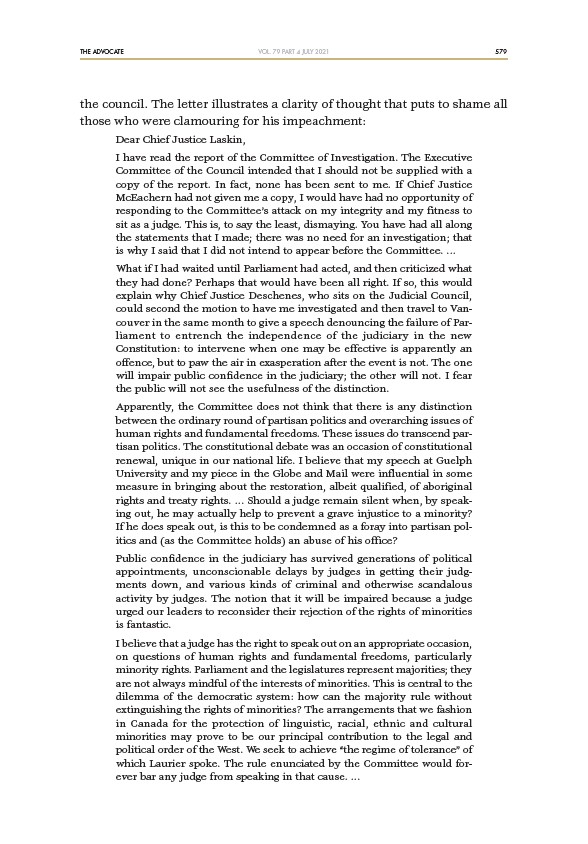
THE ADVOCATE 579
VOL. 79 PART 4 JULY 2021
the council. The letter illustrates a clarity of thought that puts to shame all
those who were clamouring for his impeachment:
Dear Chief Justice Laskin,
I have read the report of the Committee of Investigation. The Executive
Committee of the Council intended that I should not be supplied with a
copy of the report. In fact, none has been sent to me. If Chief Justice
McEachern had not given me a copy, I would have had no opportunity of
responding to the Committee’s attack on my integrity and my fitness to
sit as a judge. This is, to say the least, dismaying. You have had all along
the statements that I made; there was no need for an investigation; that
is why I said that I did not intend to appear before the Committee. …
What if I had waited until Parliament had acted, and then criticized what
they had done? Perhaps that would have been all right. If so, this would
explain why Chief Justice Deschenes, who sits on the Judicial Council,
could second the motion to have me investigated and then travel to Vancouver
in the same month to give a speech denouncing the failure of Parliament
to entrench the independence of the judiciary in the new
Constitution: to intervene when one may be effective is apparently an
offence, but to paw the air in exasperation after the event is not. The one
will impair public confidence in the judiciary; the other will not. I fear
the public will not see the usefulness of the distinction.
Apparently, the Committee does not think that there is any distinction
between the ordinary round of partisan politics and overarching issues of
human rights and fundamental freedoms. These issues do transcend partisan
politics. The constitutional debate was an occasion of constitutional
renewal, unique in our national life. I believe that my speech at Guelph
University and my piece in the Globe and Mail were influential in some
measure in bringing about the restoration, albeit qualified, of aboriginal
rights and treaty rights. … Should a judge remain silent when, by speaking
out, he may actually help to prevent a grave injustice to a minority?
If he does speak out, is this to be condemned as a foray into partisan politics
and (as the Committee holds) an abuse of his office?
Public confidence in the judiciary has survived generations of political
appointments, unconscionable delays by judges in getting their judgments
down, and various kinds of criminal and otherwise scandalous
activity by judges. The notion that it will be impaired because a judge
urged our leaders to reconsider their rejection of the rights of minorities
is fantastic.
I believe that a judge has the right to speak out on an appropriate occasion,
on questions of human rights and fundamental freedoms, particularly
minority rights. Parliament and the legislatures represent majorities; they
are not always mindful of the interests of minorities. This is central to the
dilemma of the democratic system: how can the majority rule without
extinguishing the rights of minorities? The arrangements that we fashion
in Canada for the protection of linguistic, racial, ethnic and cultural
minorities may prove to be our principal contribution to the legal and
political order of the West. We seek to achieve “the regime of tolerance” of
which Laurier spoke. The rule enunciated by the Committee would forever
bar any judge from speaking in that cause. …